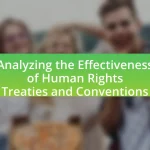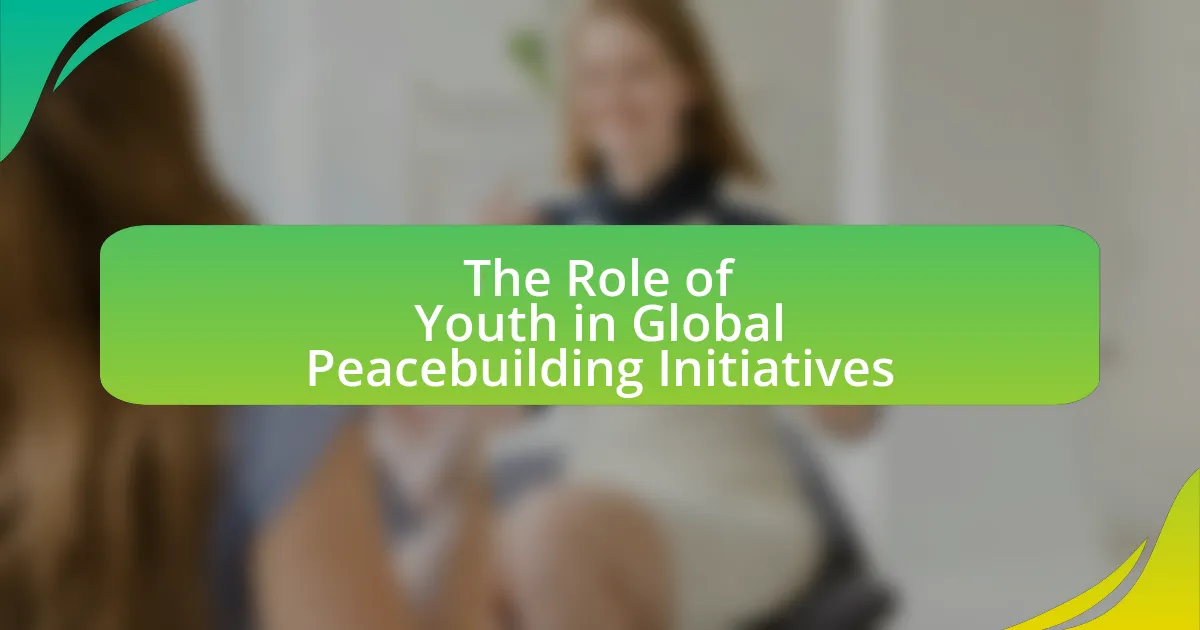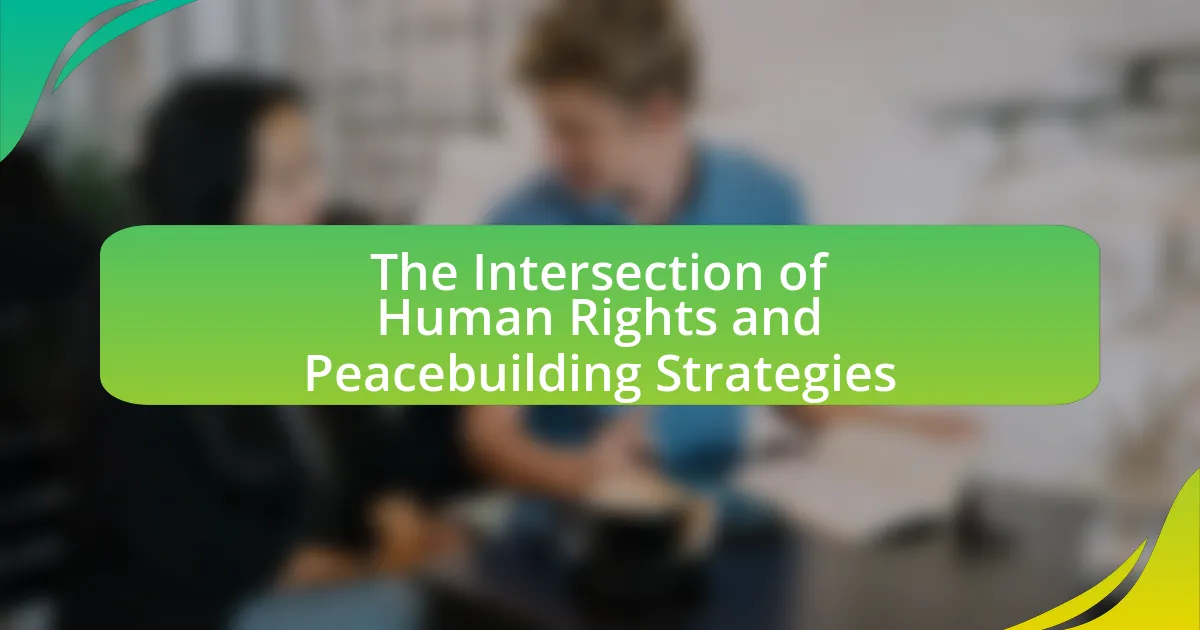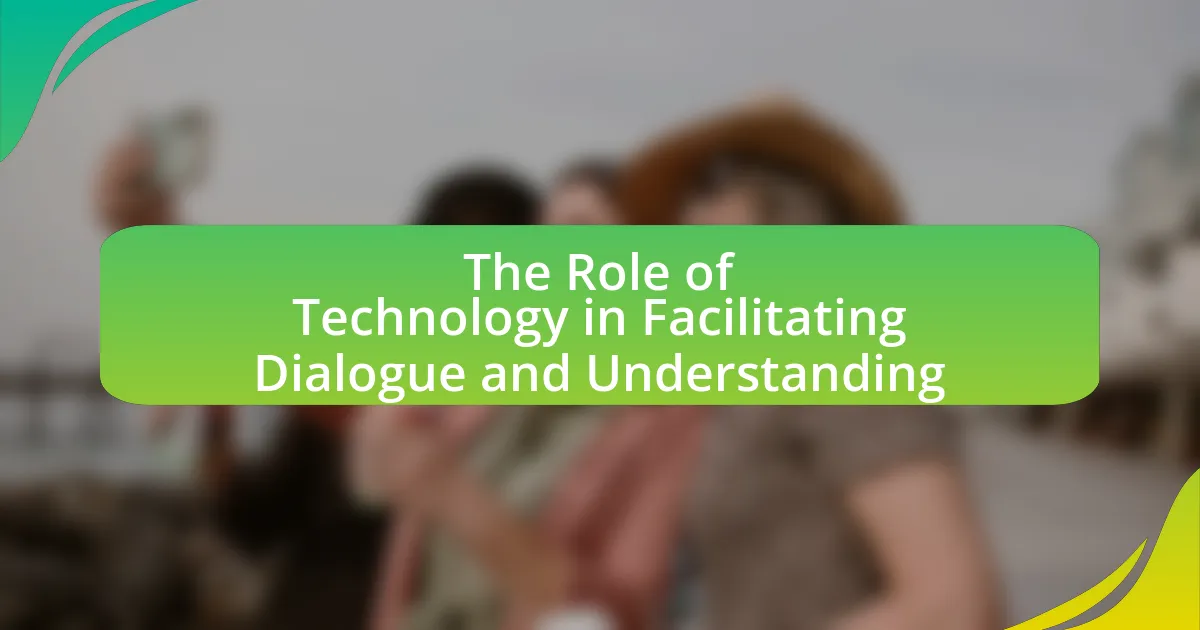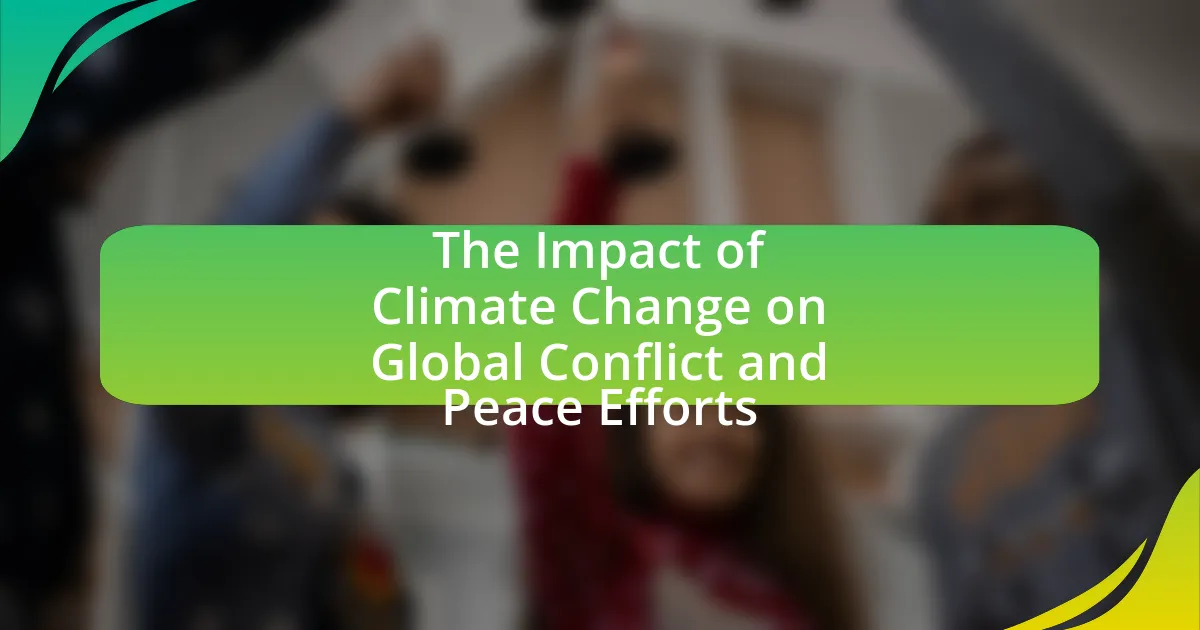Women’s empowerment is identified as a crucial catalyst for peace in conflict zones, promoting gender equality and enhancing women’s participation in decision-making processes. The article highlights the significant impact of empowered women on conflict resolution and peacebuilding, supported by research indicating that their involvement in peace negotiations increases the likelihood of durable agreements. Key elements of women’s empowerment include access to education, economic independence, political participation, and protection from violence, all of which contribute to social stability. The article also discusses the challenges women face in conflict areas, the influence of cultural perceptions, and strategies to enhance their empowerment, ultimately demonstrating that women’s active participation is essential for achieving sustainable peace.

What is Women’s Empowerment as a Catalyst for Peace in Conflict Zones?
Women’s empowerment serves as a catalyst for peace in conflict zones by promoting gender equality, enhancing women’s participation in decision-making, and fostering social cohesion. Empowered women contribute to conflict resolution and peacebuilding efforts, as evidenced by the United Nations Security Council Resolution 1325, which emphasizes the importance of women’s involvement in peace processes. Research indicates that when women are included in peace negotiations, the likelihood of reaching an agreement increases by 35% and the durability of peace is enhanced, with studies showing that agreements are 20% more likely to last at least 15 years. Thus, women’s empowerment not only addresses gender disparities but also plays a crucial role in establishing sustainable peace in conflict-affected areas.
How does women’s empowerment contribute to peacebuilding in conflict areas?
Women’s empowerment significantly contributes to peacebuilding in conflict areas by enhancing women’s roles in decision-making processes and fostering social cohesion. Empowered women are more likely to participate in peace negotiations and community rebuilding efforts, which leads to more inclusive and sustainable peace agreements. For instance, research by the United Nations indicates that peace agreements are 35% more likely to last at least 15 years when women are involved in the negotiation process. Additionally, women’s empowerment initiatives, such as education and economic opportunities, reduce the likelihood of violence by addressing root causes of conflict, thereby promoting stability and resilience in affected communities.
What are the key elements of women’s empowerment in these contexts?
The key elements of women’s empowerment in conflict zones include access to education, economic independence, political participation, and protection from violence. Access to education enables women to gain knowledge and skills necessary for leadership roles, as evidenced by studies showing that educated women are more likely to advocate for peace and community development. Economic independence allows women to support themselves and their families, reducing reliance on potentially violent partners or systems, which is supported by data indicating that women’s economic participation can lead to more stable societies. Political participation ensures that women’s voices are included in decision-making processes, which has been shown to result in more comprehensive peace agreements. Lastly, protection from violence is crucial, as it creates a safe environment for women to engage in these empowering activities, with research indicating that societies that prioritize women’s safety experience lower levels of conflict.
How does women’s participation in peace processes influence outcomes?
Women’s participation in peace processes significantly enhances the likelihood of sustainable peace outcomes. Research indicates that when women are involved in peace negotiations, agreements are 35% more likely to last at least 15 years. This is supported by data from the United Nations, which shows that women’s inclusion leads to more comprehensive peace agreements that address a wider range of issues, including social and economic factors. Furthermore, women’s perspectives contribute to more inclusive and representative decision-making, which fosters greater community support for peace initiatives.
Why is women’s empowerment crucial in conflict zones?
Women’s empowerment is crucial in conflict zones because it enhances social stability and promotes peacebuilding efforts. Empowered women contribute to conflict resolution and recovery by participating in decision-making processes, which leads to more inclusive and effective governance. Research indicates that when women are involved in peace negotiations, the resulting agreements are 35% more likely to last at least 15 years. Furthermore, women’s empowerment helps address the root causes of conflict, such as poverty and inequality, thereby fostering long-term stability.
What historical examples illustrate the impact of women’s empowerment on peace?
Historical examples illustrating the impact of women’s empowerment on peace include the role of women in the Liberian civil war and the peace process that followed. Women, led by figures like Leymah Gbowee, organized the Women of Liberia Mass Action for Peace, which successfully pressured warring factions to negotiate and ultimately led to the end of the conflict in 2003. This grassroots movement demonstrated that women’s collective action can significantly influence peace negotiations and outcomes. Additionally, in Rwanda, after the genocide in 1994, women played a crucial role in rebuilding the nation and fostering reconciliation, leading to increased representation of women in government and a more stable society. These instances underscore how empowering women can lead to sustainable peace and conflict resolution.
How do cultural perceptions of women affect their role in peacebuilding?
Cultural perceptions of women significantly influence their role in peacebuilding by either empowering or limiting their participation in conflict resolution processes. In societies where women are viewed as caregivers and peacekeepers, they often play crucial roles in mediating conflicts and fostering dialogue, as evidenced by the inclusion of women in peace negotiations in countries like Liberia, where women’s groups were instrumental in ending civil war. Conversely, in cultures that prioritize traditional gender roles, women’s contributions may be undervalued, leading to their exclusion from decision-making forums, which can hinder comprehensive peace efforts. Research indicates that when women are actively involved in peace processes, the likelihood of sustainable peace increases by 35%, highlighting the importance of shifting cultural perceptions to enhance women’s roles in peacebuilding.
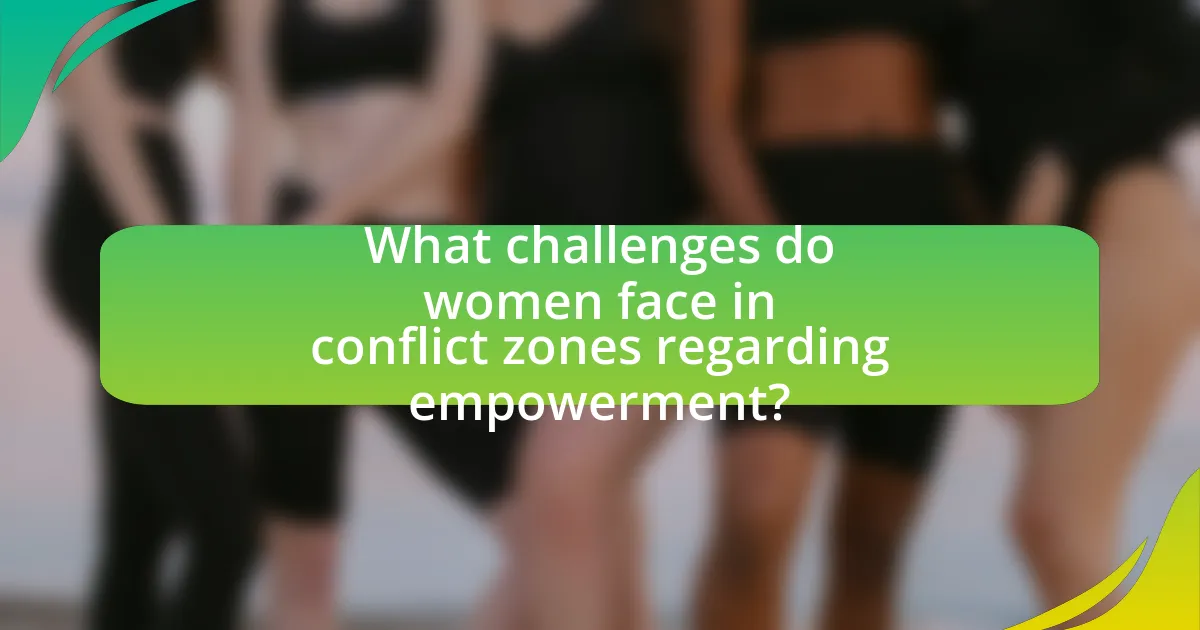
What challenges do women face in conflict zones regarding empowerment?
Women in conflict zones face significant challenges regarding empowerment, including violence, lack of access to education, and limited economic opportunities. These challenges are exacerbated by the breakdown of social structures and the prevalence of gender-based violence, which can hinder women’s participation in peace processes. For instance, the United Nations reports that women are often excluded from decision-making roles in post-conflict reconstruction, limiting their ability to influence policies that affect their lives. Additionally, according to a study by the International Rescue Committee, women in conflict areas are more likely to experience displacement and loss of livelihoods, further entrenching their marginalization. These factors collectively impede women’s empowerment and their potential role as catalysts for peace.
How do societal norms hinder women’s empowerment in these regions?
Societal norms hinder women’s empowerment in conflict zones by perpetuating gender inequality and limiting women’s access to education, employment, and decision-making roles. In many regions, traditional beliefs prioritize male authority and restrict women’s participation in public life, leading to systemic discrimination. For instance, a study by the World Bank indicates that in regions with strong patriarchal norms, women’s labor force participation is significantly lower, often below 30%, compared to over 60% in more egalitarian societies. This lack of economic independence restricts women’s ability to influence community decisions and access resources, further entrenching their marginalization. Additionally, societal expectations often dictate that women prioritize family roles over personal aspirations, which diminishes their opportunities for leadership and civic engagement.
What specific barriers prevent women from participating in peace processes?
Specific barriers preventing women from participating in peace processes include cultural norms, lack of representation, and inadequate support systems. Cultural norms often dictate that women should not engage in public decision-making, limiting their involvement. Additionally, women are frequently underrepresented in peace negotiations, with studies indicating that only 13% of negotiators in peace processes are women. Furthermore, inadequate support systems, such as lack of access to education and resources, hinder women’s ability to participate effectively. These barriers collectively restrict women’s contributions to peacebuilding efforts.
How do security issues impact women’s ability to engage in peacebuilding?
Security issues significantly hinder women’s ability to engage in peacebuilding by creating environments of fear and instability that limit their participation. In conflict zones, women often face increased violence, including gender-based violence, which deters them from taking active roles in peace processes. For instance, a study by the United Nations indicates that in areas of high conflict, women’s participation in peace negotiations drops to less than 5%. Additionally, the lack of security can restrict women’s mobility and access to resources, further marginalizing their voices in peacebuilding efforts. This systemic exclusion not only undermines women’s contributions but also perpetuates cycles of violence and instability, as inclusive peace processes are more likely to lead to sustainable peace.
What strategies can enhance women’s empowerment in conflict zones?
Strategies that can enhance women’s empowerment in conflict zones include promoting education, increasing economic opportunities, and ensuring participation in peace processes. Education equips women with knowledge and skills, which is essential for their independence and leadership roles; for instance, programs like the United Nations Girls’ Education Initiative have shown that educating girls can lead to improved community stability. Increasing economic opportunities through microfinance and vocational training enables women to gain financial independence, as evidenced by studies indicating that women’s economic participation can reduce conflict and promote peace. Furthermore, ensuring women’s participation in peace negotiations and decision-making processes is crucial, as research from the United Nations indicates that peace agreements are more likely to last when women are involved, highlighting the importance of their voices in shaping sustainable solutions.
How can education and economic opportunities support women’s roles in peace?
Education and economic opportunities significantly enhance women’s roles in peace by equipping them with the skills and resources necessary for leadership and community engagement. Access to education fosters critical thinking and negotiation skills, enabling women to participate effectively in peacebuilding processes. For instance, a study by the United Nations Development Programme found that countries with higher female education levels are more likely to experience sustained peace. Economic opportunities, such as access to jobs and financial resources, empower women to contribute to their communities and advocate for peaceful resolutions. Research from the World Bank indicates that women’s economic participation can reduce conflict by promoting stability and social cohesion. Thus, education and economic opportunities are vital in empowering women as key actors in peace initiatives.
What role do international organizations play in promoting women’s empowerment?
International organizations play a crucial role in promoting women’s empowerment by implementing policies, providing funding, and facilitating programs that enhance women’s rights and participation in various sectors. For instance, the United Nations Entity for Gender Equality and the Empowerment of Women (UN Women) actively works to eliminate discrimination against women and promote gender equality through initiatives that support women’s economic empowerment, leadership, and participation in peace processes. According to a 2020 UN Women report, countries with higher levels of women’s participation in peace negotiations are more likely to achieve sustainable peace, highlighting the effectiveness of these organizations in fostering women’s roles in conflict resolution and peacebuilding.

How can women’s empowerment lead to sustainable peace?
Women’s empowerment can lead to sustainable peace by fostering inclusive decision-making and enhancing social cohesion. When women participate in peace processes, they bring diverse perspectives that address the root causes of conflict, leading to more comprehensive and lasting solutions. Research indicates that peace agreements are 35% more likely to last at least 15 years when women are involved in the negotiation process (UN Women, 2015). Furthermore, empowered women contribute to community resilience by promoting education, economic stability, and health, which are essential for long-term peace. Thus, integrating women into peacebuilding efforts not only addresses immediate conflict but also lays the groundwork for a stable and harmonious society.
What are the long-term benefits of empowering women in conflict resolution?
Empowering women in conflict resolution leads to sustainable peace and stability in societies. Research indicates that when women participate in peace processes, agreements are 35% more likely to last at least 15 years. This is supported by the UN Women report, which highlights that women’s involvement brings diverse perspectives and fosters inclusive dialogue, addressing the root causes of conflict more effectively. Additionally, empowering women contributes to improved community resilience, as women often play crucial roles in rebuilding social structures and promoting reconciliation post-conflict.
How does women’s leadership in peace initiatives affect community resilience?
Women’s leadership in peace initiatives significantly enhances community resilience by fostering inclusive decision-making and promoting social cohesion. Research indicates that when women participate in peace processes, communities experience improved stability and reduced violence. For instance, a study by the United Nations found that peace agreements are 35% more likely to last at least 15 years when women are involved in the negotiation process. This involvement leads to the incorporation of diverse perspectives, addressing the needs of various community members, which strengthens trust and cooperation among different groups. Consequently, communities led by women in peace initiatives are better equipped to recover from conflicts and build sustainable futures.
What evidence supports the link between women’s empowerment and lasting peace?
Women’s empowerment significantly contributes to lasting peace, as evidenced by various studies and historical contexts. Research conducted by the United Nations indicates that countries with higher levels of gender equality are less likely to experience conflict and more likely to sustain peace. For instance, the UN Women report highlights that women’s participation in peace negotiations leads to more durable agreements; specifically, peace agreements are 35% more likely to last for at least 15 years when women are involved in the negotiation process. Additionally, the World Bank has found that empowering women economically and socially reduces the risk of violence and instability, as women often advocate for community well-being and conflict resolution. These findings underscore the critical role of women’s empowerment in fostering environments conducive to lasting peace.
What best practices can be implemented to support women’s empowerment in conflict zones?
Implementing best practices to support women’s empowerment in conflict zones includes establishing safe spaces for women, providing access to education and vocational training, and promoting women’s participation in peacebuilding processes. Safe spaces allow women to share experiences and access resources, which is crucial in environments where they face violence and discrimination. Access to education and vocational training equips women with skills necessary for economic independence, as evidenced by the World Bank’s findings that educated women contribute significantly to economic growth. Additionally, involving women in peace negotiations has been shown to lead to more sustainable peace agreements, as highlighted by UN Women, which states that peace processes are 35% more likely to last at least 15 years when women participate.
How can local communities foster an environment conducive to women’s empowerment?
Local communities can foster an environment conducive to women’s empowerment by implementing inclusive policies, providing access to education, and promoting economic opportunities for women. Inclusive policies, such as gender quotas in local governance, ensure women’s representation and voice in decision-making processes. Access to education is critical; according to UNESCO, each additional year of schooling can increase a woman’s income by up to 20%. Furthermore, promoting economic opportunities through skills training and microfinance initiatives enables women to achieve financial independence, which is essential for empowerment. These strategies collectively create a supportive framework that enhances women’s roles in society, contributing to peace and stability in conflict zones.
What role can policy changes play in enhancing women’s participation in peace processes?
Policy changes can significantly enhance women’s participation in peace processes by creating frameworks that promote gender equality and inclusion. For instance, implementing quotas for women in peace negotiations has been shown to increase their representation; the United Nations Security Council Resolution 1325 emphasizes the importance of women’s involvement in peace and security efforts. Additionally, policies that provide training and resources for women leaders can empower them to take active roles in negotiations, as evidenced by the success of women-led initiatives in countries like Liberia, where women’s advocacy was crucial in ending civil conflict. These changes not only facilitate women’s participation but also lead to more sustainable and comprehensive peace agreements.
